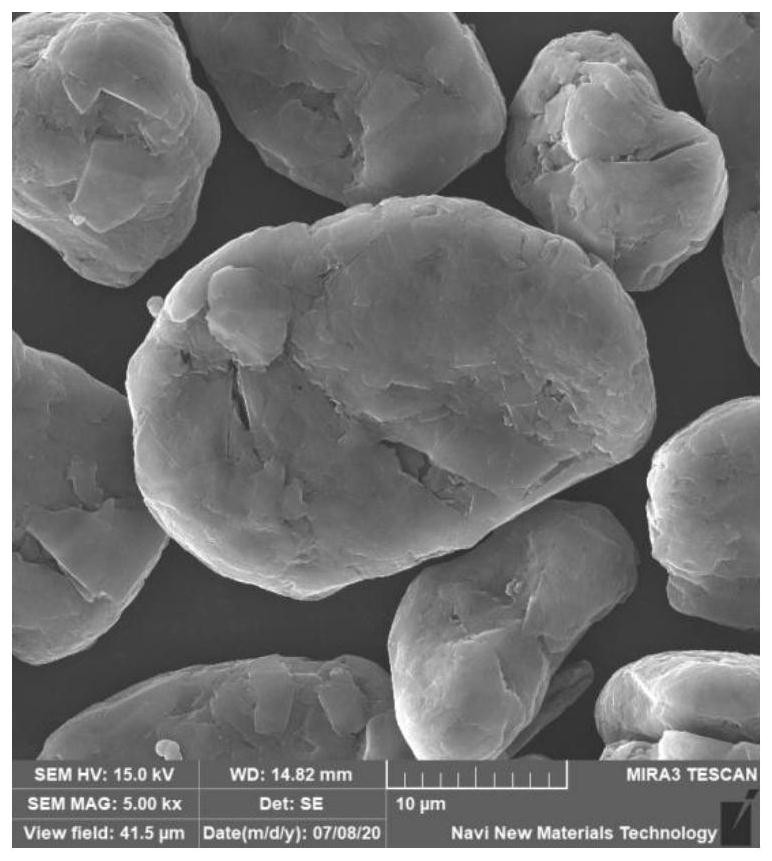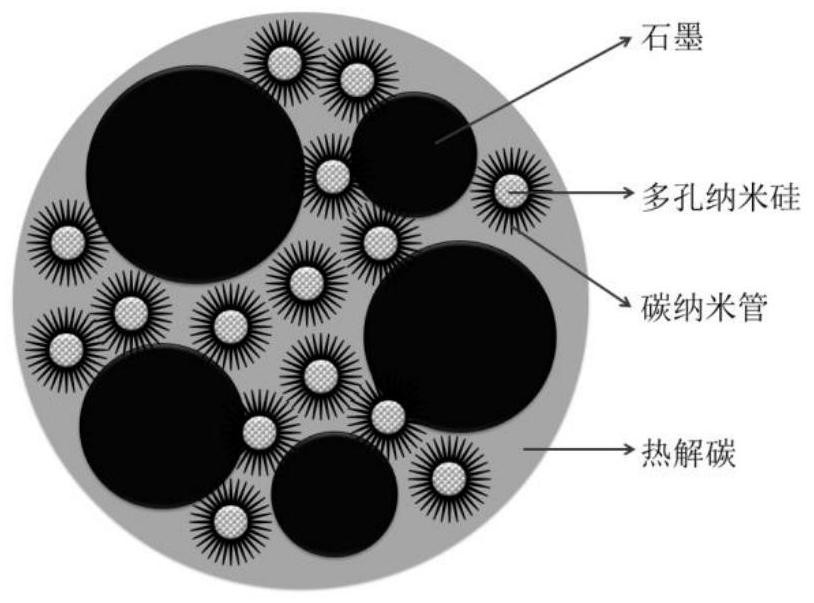Si/CNT/graphite@C composite silicon-carbon negative electrode material as well as preparation and application thereof
A negative electrode material, graphite technology, applied in carbon preparation/purification, nanotechnology for materials and surface science, silicon, etc., can solve problems such as unsatisfactory chemical properties and unsatisfactory performance
- Summary
- Abstract
- Description
- Claims
- Application Information
AI Technical Summary
Problems solved by technology
Method used
Image
Examples
Embodiment 1
[0085] ①Take 0.05gAgNO 3 Dissolve in 50ml of HF solution with a concentration of 10M, add 1g of nano-silicon particles into the mixture and stir for 0.5h, then add 10ml of hydrogen peroxide (30%H 2 o 2 aqueous solution), continue to stir for 1 hour, filter with suction, wash, and dry in an oven at 120°C;
[0086] ②Add the obtained porous silicon (0.8g) and 0.05g of cobalt chloride to 20ml of water and 10ml of ethanol, stir and dissolve, then dry in an oven at 80°C;
[0087] ③The obtained material (0.85g), spherical graphite (0.5g), polyvinylidene fluoride (0.05g), and 0.2g pitch are placed in a mixer and mixed evenly, and the mixed material is sent into a kneader, To granulate;
[0088] ④ Place the material obtained in the previous step in a nitrogen atmosphere furnace, vacuumize, keep the pressure in the furnace at 200Pa, and perform heat treatment. The heat treatment temperature is 750°C, and the holding time is 2h;
[0089] ⑤ Place the material obtained in the previous ...
Embodiment 2
[0094] ①Take 0.05gAgNO 3 Dissolve in 50ml of HF solution with a concentration of 10M, add 1g of nano-silicon particles into the mixture and stir for 0.5h, then add 10ml of hydrogen peroxide (30%H 2 o 2 aqueous solution), continue to stir for 1 hour, filter with suction, wash, and dry in an oven at 120°C;
[0095] ②Add the obtained porous silicon (0.75g; porosity 22%) and 0.1g ferric nitrate to 20ml water, stir and dissolve, then dry in an oven at 80°C;
[0096] ③Place the obtained material (0.85g), petroleum coke (2g), polypropylene (0.05g), and 0.2g phenolic resin in a mixer to mix evenly, and send the mixed material into a kneader for granulation ;
[0097] ④ Place the material obtained in the previous step in a nitrogen atmosphere furnace, vacuumize, keep the pressure in the furnace at 500Pa, and perform heat treatment. The heat treatment temperature is 800°C, and the holding time is 3h;
[0098] ⑤ Place the material obtained in the previous step in a hydrogen atmospher...
Embodiment 3
[0103] ①Take 0.05gAgNO 3 Dissolve in 50ml of HF solution with a concentration of 10M, add 1g of nano-silicon particles into the mixture and stir for 0.5h, then add 10ml of hydrogen peroxide (30%H 2 o 2 aqueous solution), continue to stir for 1h, filter with suction, wash, and dry in an oven at 120°C
[0104] ②Add the obtained porous silicon (0.85g) and 0.1g of nickel oxalate into 20ml of water, stir and dissolve, then dry in an oven at 80°C;
[0105] ③Put the obtained material, natural graphite (2g), sodium alginate (0.05g), and 0.2g glucose in a mixer for uniform mixing, and send the mixed material into a kneader for granulation;
[0106] ④ Place the material obtained in the previous step in a nitrogen atmosphere furnace, vacuumize, keep the pressure in the furnace at 200Pa, and perform heat treatment. The heat treatment temperature is 600°C, and the holding time is 4h;
[0107] ⑤ Place the material obtained in the previous step in a hydrogen atmosphere furnace, and conduc...
PUM
| Property | Measurement | Unit |
|---|---|---|
| size | aaaaa | aaaaa |
| current efficiency | aaaaa | aaaaa |
| current efficiency | aaaaa | aaaaa |
Abstract
Description
Claims
Application Information
 Login to View More
Login to View More - R&D
- Intellectual Property
- Life Sciences
- Materials
- Tech Scout
- Unparalleled Data Quality
- Higher Quality Content
- 60% Fewer Hallucinations
Browse by: Latest US Patents, China's latest patents, Technical Efficacy Thesaurus, Application Domain, Technology Topic, Popular Technical Reports.
© 2025 PatSnap. All rights reserved.Legal|Privacy policy|Modern Slavery Act Transparency Statement|Sitemap|About US| Contact US: help@patsnap.com



